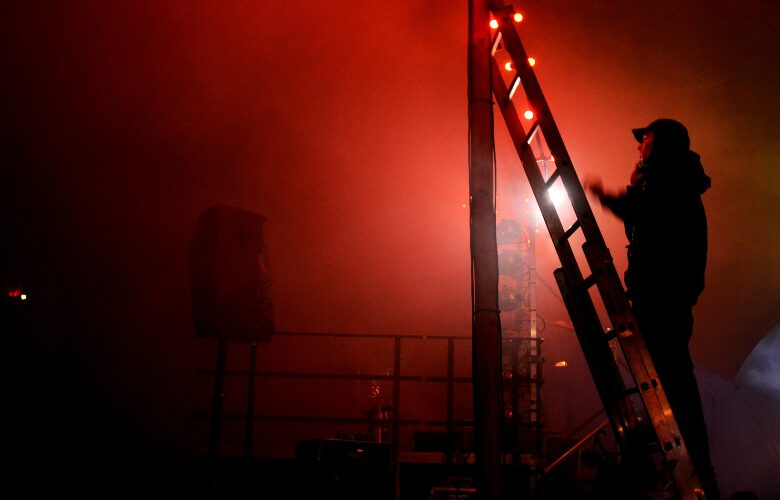All The Roadies Are Gone.

The corporatization of the music industry killed off more roadies than illicit drugs ever could.
The word roadie used to conjure up images of non-stop partying with rock stars, handing out laminates to groupies and drinking right up until load-in. The hours were long, the pay was barely enough to cover rent, and the debauchery knew no rival. Roadies of old were falling off stages, taking 400 amps through the heart, and eating cardboard disguised as pizza. They would bounce right back up and continue to hang a thousand par cans with nothing but a wrench and a great story to tell at the bar.
Their bad habits and poor nutritional choices were not able to bring about their demise though. The corporatization of the music industry killed off more roadies than illicit drugs ever could. I’m sad to report that the legendary roadies of rock ‘n roll past are now an endangered species. There is no legislation that can be passed to save them. The industry has evolved and those who were unable to adapt have all but died off. Let’s apply some forensic exploration into what happened to these legendary creatures.
Show business is more business than show.
Less than a generation ago, musicians toured to sell albums. The tour used to be the promotion, and the album sales were the gravy. Tours used to be funded by record labels in order to move the product. But thanks to the digital age, there is no musical product left to sell. Streaming and downloading replaced vinyl, cassette and CD sales almost completely. Now the only products that generate meaningful revenue are beer sales and merch. Even the corporatization of the promotion game has funneled more money into the pockets of global promoters and away from artists.
The last piece of pie is merch sales. This has forced many aging rockers out of retirement and back onto the road. This sounds like great news for roadies, but the margins are thinner than they once were. Bean counters are involved in every decision now. This level of scrutiny rarely affords the bus stocks of Johnny Walker and Grey Goose.
Roadies don’t go sober.
Grumpiness is no longer celebrated.
In order to make a profit, bands must be on the road longer. It takes months to get a return on their investment instead of weeks. This means that roadies must be out for longer. Burn out is no longer an option. Burning the candle at both ends works great for a month-long tour when you can crash for a week afterwards. Caffeine can only carry us so far. When tours last for five months, we need to find ways to thrive together and support one another in close quarters. Throwing radios and berating stagehands during load-in is no longer widely acceptable. We are all here to do a job that we can be proud of. We need to do it ethically, politely, and efficiently. Thanks to social media, our reputations can precede us far beyond the next town. Mental health awareness, online and in person, is spreading. We are learning that the old suck-it-up mentality leads to bitterness and exhaustion. We have resources available to us that our predecessors never had.
Roadies don’t do therapy.
Trashing hotel rooms is cliché.
Tossing TVs out of hotel windows, overturned couches, and the lingering smell of groupies and mud sharks may have been the fuel for legends of old, but those days have passed us by. Rockstars, and by extension road crew, are applauded for their environmentalism and philanthropy more than their lascivious exploits. The Bon Jovis of the world have retired their outlaw spurs and replaced them with stock portfolios and organizations to combat issues that force families and individuals into economic despair. Rockstars are funding the creation of programs that support community efforts to break the cycle of poverty and homelessness instead of squandering that hard earned cash on drugs and women.
Even the appallingly sexist Beastie Boys of old heard criticisms about being misogynistic, homophobic jerks and actually listened to them. The Beasties’ took several steps to distance themselves from the toxic misogyny of their early days to reemerge as the relatively enlightened artists of their later career. This transformation affected the crews as well. Even when I started touring in the 2000’s the roadie stories were still prevalent in the media. I still had to convince my wife that the stories were exaggerated and that my life on the road was nothing like what she had seen on MTV. After visiting me on tour in 2005, she finally realized that a backstage pass allowed her to watch a bunch of crew members sleeping on cases and not a carnal orgy. There were no groupies to be found backstage, just a lot of empty cases.
Roadies don’t admit when they’re wrong.
Technician is the new normal.
Some roadies who worked in the 1960s through the 1980s have detailed their sexual conquests, wild partying, and drug use while on the road and adapted them into books and screenplays. Jef Hickey, roadie for bands like Queens of the Stone Age, Megadeth, Motörhead, and author of the autobiography “I Thought You Were Dead” is even quoted as saying
Sure, the love of music is what initially attracted me to the bright stage lights, but the moment I discovered the magical, almost hypnotic power that a laminated backstage pass swinging from a lanyard had on wide-eyed, high-heeled, short-skirted women, the love of the spectacle suddenly dissipated.
These roadies were in it for the sex, drugs, and rock ‘n roll of it all. Most modern technicians are in it for the paycheck.
Several new monikers have been used to describe what we have evolved into. Touring Professionals, Road crew, and Crew member have all been used to replace the now derogatory term roadie. But none of these terms accurately describe the hard work and effort that we put into our craft. Touring Technician seems to best describe what we do. The word technician implies that we are experts in the practical application of a science. We may still lug the gear, manage the stage, sell the merch, drive the bus, and generally do whatever it takes to make concerts possible, but that takes expertise now. Not to discount the excellence of previous generations, but networking hundreds of fixtures, projection mapping laser projectors, and automated aerial acts are not in the same category as hanging par cans. The days of hiring the tour manager’s second cousin to be the stage manager because he has
a strong work ethic won’t cut the mustard any longer. Being a touring technician in 2023 requires extensive training, experience, and possibly a university degree. There are still legends among us that were hired as a driver and advanced to production manager, but their numbers are dwindling.
For a better comparison, I recommend reading Mötley Crue’s “The Dirt” and comparing it to guitar tech Matt McGinn’s “Roadie: My Life on The Road With Coldplay”. The different definitions of the term roadie are staggering.

We can still use the term roadie as a term of endearment amongst ourselves, but I’d never introduce myself to anyone outside the industry as a roadie because all the roadies are gone.
Back to Home
Editor's Note: At StageLync, an international platform for the performing arts, we celebrate the diversity of our writers' backgrounds. We recognize and support their choice to use either American or British English in their articles, respecting their individual preferences and origins. This policy allows us to embrace a wide range of linguistic expressions, enriching our content and reflecting the global nature of our community.
🎧 Join us on the StageLync Podcast for inspiring stories from the world of performing arts! Tune in to hear from the creative minds who bring magic to life, both onstage and behind the scenes. 🎙️ 👉 Listen now!